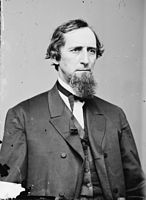| |||||||||||||||||
| |||||||||||||||||
| |||||||||||||||||
On January 15, 1867, Simon Cameron was elected to the United States Senate by the Pennsylvania General Assembly for the third time; it had previously chosen him in 1845 and 1857. The legislature voted for Cameron over the incumbent, Senator Edgar Cowan, who, though a Republican, was endorsed by the Democratic legislative caucus. With the Republican Party holding a large majority in the legislature, the main battle was for its endorsement: the caucus of Republican legislators had voted for Cameron over Governor Andrew Curtin.
Cameron and Curtin each led a different faction of the Republican Party and had clashed as early as 1855, resulting in a bitter rivalry. Cameron tried to prevent Curtin from getting the Republican nomination for governor in 1860, while Curtin attempted to stop Cameron from receiving a post in Abraham Lincoln's cabinet; each was unsuccessful. Cameron's time as Secretary of War ended with his resignation under pressure, and he sought, unsuccessfully, to return to the Senate in 1863. With Curtin's second term as governor ending in 1867 and Cameron still wanting to return to the Senate, each sought Cowan's seat.
Cowan had moved away from the Republican mainstream, becoming an ally of President Andrew Johnson, and was not a contender for the party endorsement. Others seeking the Republican nomination included Representative Thaddeus Stevens and Galusha Grow, a former speaker of the House of Representatives, but they needed a deadlock between the main contenders to have a chance. Both Cameron and Curtin sought support from among Republican candidates for the legislature, and also tried to place their supporters in positions that might influence the outcome.
Curtin supporter Matthew Quay was the favorite to become Speaker of the Pennsylvania House of Representatives, but the other Senate contenders combined to defeat him, and the victor, Cameron supporter John P. Glass, used his powers to influence Republican legislators. Cameron received the necessary majority of Republican legislators to gain the party's endorsement, while Cowan was endorsed by the Democrats. When the legislature voted, Cameron easily defeated Cowan, and served in the Senate until 1877; his powerful political machine dominated Pennsylvania politics for a half century. Curtin eventually switched to the Democratic Party, and served three terms in the House of Representatives in the 1880s; Cowan never held public office again.
| Elections in Pennsylvania |
|---|
 |
|
|


